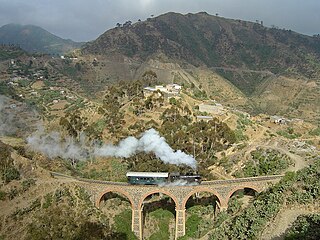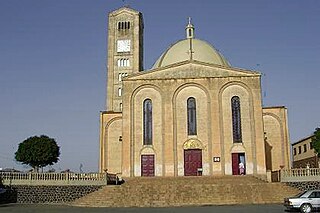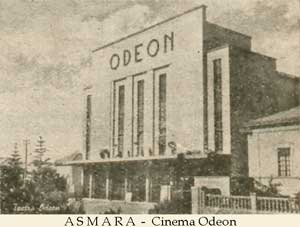"Eritrea" is an ancient name, associated in the past with its Greek form Erythraia, Ἐρυθραία, and its derived Latin form Erythræa. This name relates to that of the Red Sea, then called the Erythræan Sea, from the Greek for "red", ἐρυθρός, erythros. The Italians created the colony of Eritrea in the 19th century around Asmara, and named it with its current name. After World War II Eritrea was annexed to Ethiopia. In 1991 the communist Ethiopian government was toppled by Eritrean forces and the TPLF and they earned their independence. Eritrea officially celebrated its 1st anniversary of independence on April 27, 1994.

Asmara, or Asmera, is the capital and most populous city of Eritrea, in the country's Central Region. It sits at an elevation of 2,325 metres (7,628 ft), making it the sixth highest capital in the world by altitude. The city is located at the tip of an escarpment that is both the northwestern edge of the Eritrean Highlands and the Great Rift Valley in neighbouring Ethiopia. In 2017, the city was declared as a UNESCO World Heritage Site for its well-preserved modernist architecture. The site of Asmera was first settled in 800 BC with a population ranging from 100 to 1000. The city was then founded in the 12th century AD after four separate villages unified to live together peacefully after long periods of conflict. Under Italian rule the city of Asmara was made capital of Eritrea in the last years of the 19th century.

The Eritrean Railway is the only railway system in Eritrea. It was constructed between 1887 and 1932 during the Italian Eritrea colony and connects the port of Massawa with Asmara. Originally it also connected to Bishia. The line was partly damaged by warfare in subsequent decades, but was rebuilt in the 1990s. Vintage equipment is still used on the line.

Massawa or Mitsiwa, is a port city in the Semienawi Keyih Bahri Region of Eritrea, located on the Red Sea at the northern end of the Gulf of Zula beside the Dahlak Archipelago. It has represented a historically important port for many centuries.

The Eritrean Catholic Church is a metropolitan sui iuris Eastern particular church headquartered in Asmara, Eritrea. It was established in 2015 by separation of its territory from that of the Ethiopian Catholic Church and the setting up in that territory of a new sui iuris metropolitan Eastern Catholic Church. It follows the Ge'ez form of the Alexandrian liturgical rite. Its strictly-speaking official name is "The Asmara metropolitan sui iuris Church".
Modern banking in Eritrea started with the arrival of the Italian colonizers. However, from 1974 on, the banking sector became a government monopoly. This situation continued after Eritrea achieved its independence. The Bank of Eritrea is the central bank of Eritrea.
Articles related to Eritrea include:

The history of the Jews in Eritrea stretches back many centuries. Eritrea once had a substantial Jewish community, fueled by immigrants arriving for economic reasons and to escape persecution. The community thrived for several decades before mass emigration began during the Eritrean War of Independence with Ethiopia.
Asmara Brewery is a brewery in Eritrea, founded in 1938. The brewery was nationalized by the Derg during the Eritrean War of Independence. The brewery operates a football team, which plays in the Eritrean Premier League. The factory has over 600 employees.

Sembel is East Africa's oldest archaeological site in the capital of Asmara, Maekel Region of Eritrea and It dated back to as early as 800 BCE.
The Commercial Bank of Eritrea is the only banking institution in Eritrea with full retail commercial banking services. It is a government-owned bank, with 17 branches throughout the country. The Bank has arrangements with Citibank for international money transfer, as well as with Deutsche Bank.

Eritrea, officially the State of Eritrea, is a country in the Horn of Africa, with its capital at Asmara. It is bordered by Ethiopia in the south, Sudan in the west, and Djibouti in the southeast. The northeastern and eastern parts of Eritrea have an extensive coastline along the Red Sea. The nation has a total area of approximately 117,600 km2 (45,406 sq mi), and includes the Dahlak Archipelago and several of the Hanish Islands.
Football is the most popular sport in Eritrea. After being under Ethiopian control, Eritrea gained its independence in 1991 and in 1998 the country became a member of FIFA.

Italian Eritreans are Eritrean-born descendants of Italian settlers as well as Italian long-term residents in Eritrea.

Italian Eritrea was a colony of the Kingdom of Italy in the territory of present-day Eritrea. The first Italian establishment in the area was the purchase of Assab by the Rubattino Shipping Company in 1869, which came under government control in 1882. Occupation of Massawa in 1885 and the subsequent expansion of territory would gradually engulf the region and in 1889 borders with the Ethiopian Empire were defined in the Treaty of Wuchale. In 1890 the Colony of Eritrea was officially founded.

The Independence Day of Eritrea is one of the most important public holidays in the country. It is observed on May 24 every year. On this day in 1991, Eritrean People's Liberation Front forces moved into the capital Asmara, reinstating independence, following a 30-year war against the Ethiopian military regime. Eritrea Independence Day is a national holiday, with workers given a day off.

Vincenzo DiMeglio, called also Vincenzo Di Meglio (1903-1987), was an Italian doctor who worked in the Africa Orientale Italiana in the late thirties and during World War II. He was also an Italian Eritrean politician who saved Eritrea from being divided in 1947 between Sudan and Ethiopia

Asmara Theatre, also known as Asmara Opera, is a theatre in Asmara, Eritrea. It was constructed in 1918 following a design by the Italian engineer Odoardo Cavagnari, with later renovations in 1936.

The history of cinema in Eritrea dates back to the country's colonial rule under the Kingdom of Italy. In connection with the growth of Italian cinema in the 1930s, so too did the rise of cinema occur in Asmara, Eritrea. In 1937, Asmara's Opera was converted into a dual-use theatre and cinema. By the following year, Asmara had a total of nine movie theatres.












